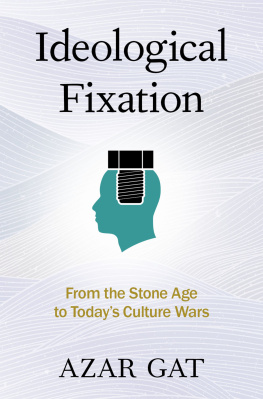Ideological Fixation

Oxford University Press is a department of the University of Oxford. It furthers the Universitys objective of excellence in research, scholarship, and education by publishing worldwide. Oxford is a registered trade mark of Oxford University Press in the UK and certain other countries.
Published in the United States of America by Oxford University Press
198 Madison Avenue, New York, NY 10016, United States of America.
Oxford University Press 2022
All rights reserved. No part of this publication may be reproduced, stored in a retrieval system, or transmitted, in any form or by any means, without the prior permission in writing of Oxford University Press, or as expressly permitted by law, by license, or under terms agreed with the appropriate reproduction rights organization. Inquiries concerning reproduction outside the scope of the above should be sent to the Rights Department, Oxford University Press, at the address above.
You must not circulate this work in any other form and you must impose this same condition on any acquirer.
Library of Congress Cataloging-in-Publication Data
Names: Gat, Azar, author.
Title: Ideological fixation : from the Stone Age to todays culture wars /Azar Gat.
Description: New York, NY : Oxford University Press, [2022] |
Includes bibliographical references and index.
Identifiers: LCCN 2022010848 (print) | LCCN 2022010849 (ebook) |
ISBN 9780197646700 (hardback) | ISBN 9780197646724 (epub)
Subjects: LCSH: IdeologyHistory.
Classification: LCC B823.3 .G38 2022 (print) | LCC B823.3 (ebook) |
DDC 145dc23/eng/20220610
LC record available at https://lccn.loc.gov/2022010848
LC ebook record available at https://lccn.loc.gov/2022010849
DOI: 10.1093/oso/9780197646700.001.0001
Contents
I began writing this book before the 2016 US presidential elections, before the terms fake news and alternative facts were coined, and before the further, ever-continuing escalation of Americas ideological civil war. What prompted the book was not any particular political development but, as all intellectual ventures should ideally be, a deep sense of wonderment; wonderment at the way people tend to be wholly enclosed within their ideological frames and entirely deafindeed, react with total rejection and hostilityto arguments and claims about the world that come from the opposite camp, no matter how valid they might be. Ideology consists of cherished normative prescriptions as to what is just and how social reality should accordingly be shaped, together with an interpretive roadmap indicating how these normative prescriptions can be implemented in the real world. Ideological fixation is the result of the ever-present tensions and conflicts between our normative wishes and interpretation of reality. I have always been intrigued by this phenomenon and by the built-in biases and gross errors in the understanding of reality it breeds.
I am an Israeli, a citizen of a country that since its inception has experienced profound existential concerns and ideological divides. More remarkably, after social theorists around 1960 proclaimed the death of ideology, ideological divides and clashes have re-emerged with renewed intensity throughout the world. Currently, they include not only the challenges to liberal democracy presented by illiberal and non-democratic China and Russia or by fundamentalist and jihadist Islam, but also deep cleavages and all-pervasive antagonisms in the liberal democracies themselves. In the United States they have become particularly acute and venomous. The zeal of the opposing sides is often scarcely less than that which characterized the religious ideologies of old, or that which prevailed between the great rival ideologies of the nineteenth and twentieth centuries: liberalism, socialism, and fascism. The other side is widely viewed as malicious, irrational, or downright stupid and, often, as barely legitimate. People are strongly predisposed to regard their own camp as both patently right and righteous, while viewing the other side as malevolent and willfully wrong. In my experience, the prospects of bringing even the best and the brightestparticularly the best and the brighteston either side of an ideological divide to critically examine their camps dogmas or consider the possibility of even a partial validity of some of the other sides arguments are very slim indeed. That those who express the opposite claims are identified with the other side is enough to close ears and minds. In this dialogue of the deaf, the arguments simply do not register and are received with a mixture of contempt and rage.
Ideologies, and hence ideological clashes, antagonism, and fixations, are as old as civilization itself. During most of history, ideologies were mainly religious, whereas during modern times they have taken the form often described as secular religions or religion substitutes. They have always served to legitimize socioeconomic and political orders, or have projected alternatives to them. The ideological mode of interpreting and relating to the world, as well as ideological fixations, seem to be intrinsic features of the human mind. In his book Thinking, Fast and Slow (2011), psychologist Daniel Kahneman has suggested that the human mind has two basic systems of operation: the first and more common relying on simple cues and heuristics used to arrive at split-second decisions; the second, far slower and more deliberate, is occasionally resorted to when a more systematic analysis of complex problems is called for. The ideological mode of thinking may belong to a third category. It involves highly complex interpretations of and emotional-behavioral reactions to the world, for which we rely on ready-made and deeply internalized templates to produce instant, reflex-like attitudes and propositions.
This book is not a survey of past and present ideologies. There are many such excellent surveys on the market. Instead, it is an attempt to understand the cognitive, emotional, and social roots of the ideological phenomenon: why we are so prone toindeed, are captive ofthe ideological mode of thinking. To find the answer to this riddle, the book combines insights from evolutionary theory regarding the nature of some of our deepest proclivities with a sweep through the great drama of history, from the Stone Age, to the rise of civilization, to the present. Ideology has been the subject of prodigious study over the past century or so. Scholars and publicists have emphasized both ideologys indispensable role as a compass guiding large-scale action and the application of social visions in the public arena and built-in biases and dogmatic, zealous rigidity in the interpretation of reality. We hope to take the inquiry of both these aspects a step further. Reversing Marxs famous saying (himself both a pioneering theorist and victim of ideological fixation): I have little faith in the ability to change this deep human propensitymy aim is to understand it.
In the first part of the book we lay the groundwork by undertaking to decipher, first, what truth isdoes this concept have a meaning, or is everybody equally entitled to his or her facts; and, second, how we are to understand morality, our vivid and deeply emotive normative coloring of the social world. Both questions have been the source of profound confusion, resurfacing with great public fanfare in the intellectual discourse of the last decades. I think you may learn from, and enjoy, this part a lot. However, if you are less interested in these profound questions that have preoccupied both philosophers and ordinary people throughout the ages, you can safely skip these preliminaries and jump right to the second and third parts of the book and into the great ideological divides and fixations of the past and present.













